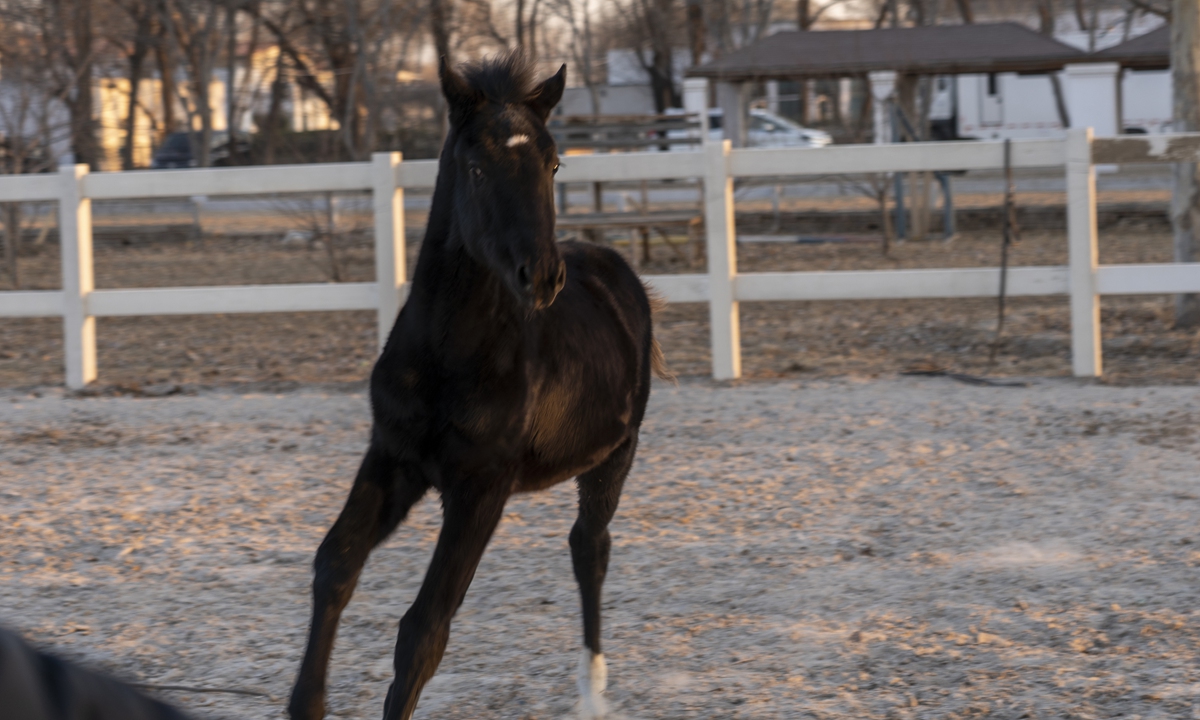

China's first registered cloned warm-blood horse "Zhuangzhuang"made its debut in Beijing on January 12, 2023. Photo: Courtesy of Sinogene Biotechnology Co.
Slender but with healthy limbs, glossy black fur with white spots on the forehead and hooves, moist eyes filled with shyness but curiosity, lively and agile running gesture… China's first registered cloned warm-blood horse made its debut on Thursday in Beijing.
Experts said the healthy birth and growth of the horse can support China's horse industry and equestrian sport and help save China's endangered horse breeds.
Running vividly and nimbly around an equestrian club's arena in Beijing's eastern suburbs with the city's first snow falling on its black sleek mane, the cloned warm-blood male horse named Zhuangzhuang (meaning growing healthy and strong) is almost 7 months old.
Zhuangzhuang was born on June 6, 2022 from a surrogate female horse in Northwest China's Gansu Province. Its birth was arranged under a cloning program co-conducted by Beijing-based gene firm Sinogene Biotechnology Co (Sinogene) and an equestrian club named Sheerwood in 2021, and then registered by the China Horse Industry Association (CHIA).
Its donor cells were collected from the skin samples of Ursus, a warm-blood horse owned by Sheerwood who was born in Germany in 1995 and came to China in 2007 with numerous awards in domestic and foreign horse riding games.
China is not the first in the world to clone horses. The first cloned horse was born in Italy in 2003, followed by successful cloned horses in countries including the US, Argentina, the UK and South Korea. The International Equestrian Federation (FEI) has allowed the participation of clones and their offspring in equestrian sport since 2012.
"Warm-blood horse cloning is an innovative breakthrough in equine breeding. By preserving and passing down the genes of excellent horses, the cost of breeding good horses can be lowered," Mi Jidong, Sinogene's general manager, said at a press conference on Thursday.
Experts said the cloning technology has provided a new possibility to further boost China's horse industry and equestrian sport, which have seen rapid development in recent years but still face problems including the scarcity of good breeding stock and lagging technologies in breed improvement.
Although cloned horses have the same genes as the donor horses, the athletic ability of the horses still needs to be conditioned and trained to reach a higher level, Sheerwood's executive director Luan Shu said at the press conference.
"Statistics show that China had an average number of imported horses of 2,500 per year before 2020. The composite cost for importing a horse, including the horse trade, shipment, inspection and quarantine, is very high," said Luan Shu during an interview with FEI in November 2022.
Sinogene said that it is exploring technologies for horse species management and disease control, as well as for saving endangered horse species in China.
Get updates on this story GLOBAL TIMES
